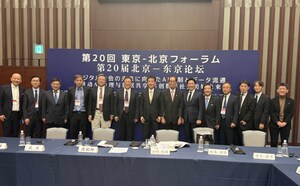Youth on Tech Latest Episode: Revealing Moon Mysteries, Exploring the Universe
BEIJING, June 26, 2023 /PRNewswire/ -- This is a report from Science and Technology Daily: China has revealed its plan to send astronauts to the moon by 2030. Themed by the "Revealing Moon Mysteries, Exploring the Universe," the latest episode of Youth on Tech invited three guests to share their thoughts on lunar exploration.
Mysteries of the moon
People have been curious about how the moon was formed for centuries, but to this day there has been no clear cut answer to the question. Zhang Tianli, an engineer of China's Lunar Exploration and Space Engineering Center (LESEC), said that currently the main hypotheses for the origin of the moon include the Giant Impact Hypothesis, Co-formation Hypothesis and Capture Hypothesis. The most widely accepted is the first one. That is, in the early solar system, a Mars-sized object collided with the young Earth and some debris gathered to form the moon.
Zhang said the Giant Impact Hypothesis explains some features of the moon, such as its small size, lack of iron core, and the similarity of isotopic compositions between the moon and Earth's mantle. "China is planning to place astronauts on the moon before 2030, and we're really looking forward to it," said Zhang.
Another often discussed topic about the moon is why humans can only see the near side of the moon from Earth. It was not until in 2018, when China's Chang'e-4 lunar probe made a historic landing on the far side of the moon that humans could have a close look at it. Obviously, the far side is much more difficult to explore than that of the near side of the moon.
Meanwhile, Low Jing Xiang, a Malaysian researcher, explained that this is because the moon is tidally locked to the Earth and the same side of the moon is always turned toward the Earth, resulting in the moon blocking of signal transmissions from the far side to the Earth. Therefore, the Chinese Queqiao Relay Satellite was set up to relay the signal from the far side of the moon, making Chang'e-4 mission successful.
Global cooperation matters
Outer space exploration is a common cause and pursuit for humanity. So it calls for international cooperation in research to expand cognitive boundaries of humans about celestial bodies.
Low, also the associate professor of Science and Technology University of China (USTC), is taking part in the International Lunar Research Station project, which was proposed by China National Space Administration (CNSA) and Roscosmos of Russia in 2021. The project is expected to be completed by 2035.
The priority for Low and his team is to study the possibility of the in situ resource utilization of lunar soils as catalysts for electrocatalytic CO2 conversion. It is an arduous task. But during the participation in this project, Low said he had caught the chance working with experts not only from China, but also from other countries such as Russia, Iran and Egypt. This kind of collaboration helped Low solve problems in his research and made him understand how important global cooperation is. "This project also shows the willingness of the leading space exploration countries to share their knowledge and collaborate with the other countries," said Low.
When talking about this, Low said he never dreamed he could be part of such a project. In 2021, when Prof. Xiong Yujie from USTC asked Low whether he wanted to participate in a space exploration project, he wondered if Prof. Xiong was serious. "Now, I am here, participating in the project," Low said.
"In my opinion, human society should work together across the country border instead of practicing seclusion policy to solve the mist in space exploration," he said.
Tips for young generation
The guests shared their personal stories and experience with young people who are interested in lunar science and have ambitions to explore outer space.
Before coming to LESEC, Shen Yuduo was a postgraduate student at Macquarie University in Australia. She majored in conference interpreting. "But I am very interested in space. I'm [always] gazing at the stars and dreaming about the endless mysteries in the vast universe," said Shen.
According to Shen, she was inspired by China's achievements in space. She believes that China is becoming one of the leading countries around the world in moon exploration. To be part of LESEC, Shen keeps working hard to learn more about space knowledge and terminologies, as well as the deep space exploration programs. "There are many transferrable skills that you can apply," said Shen, adding that "No matter what you are doing or studying, every person has endless potentials, so I do not ever set limitations on myself!"
Low believes that participating in the International Lunar Research Station project is a dream that comes true. When he shares his experience with young people, he asks them, "Why don't we go beyond the Earth, looking for something that we don't have on this planet?"
SOURCE Science and Technology Daily

WANT YOUR COMPANY'S NEWS FEATURED ON PRNEWSWIRE.COM?
Newsrooms &
Influencers
Digital Media
Outlets
Journalists
Opted In







Share this article